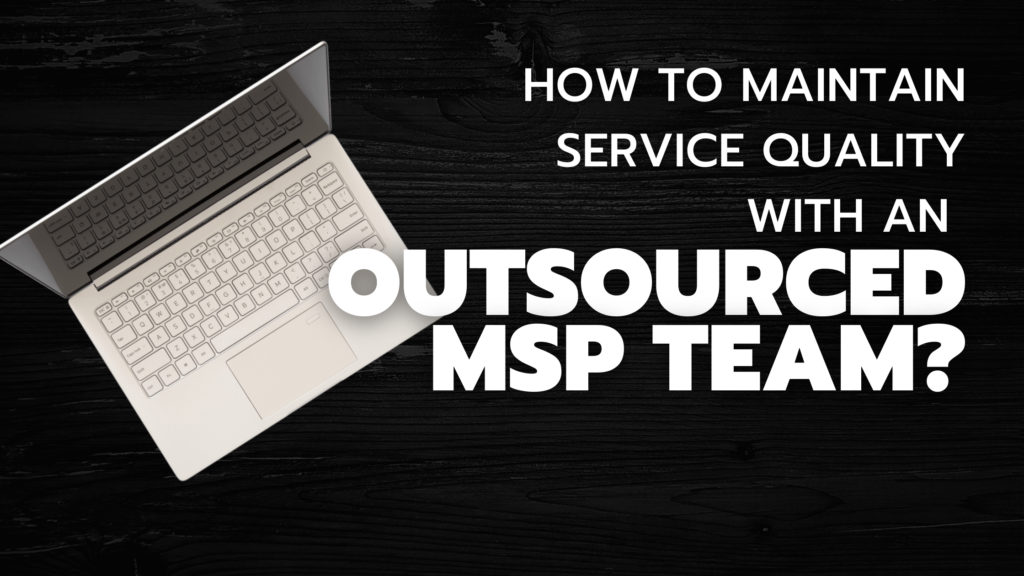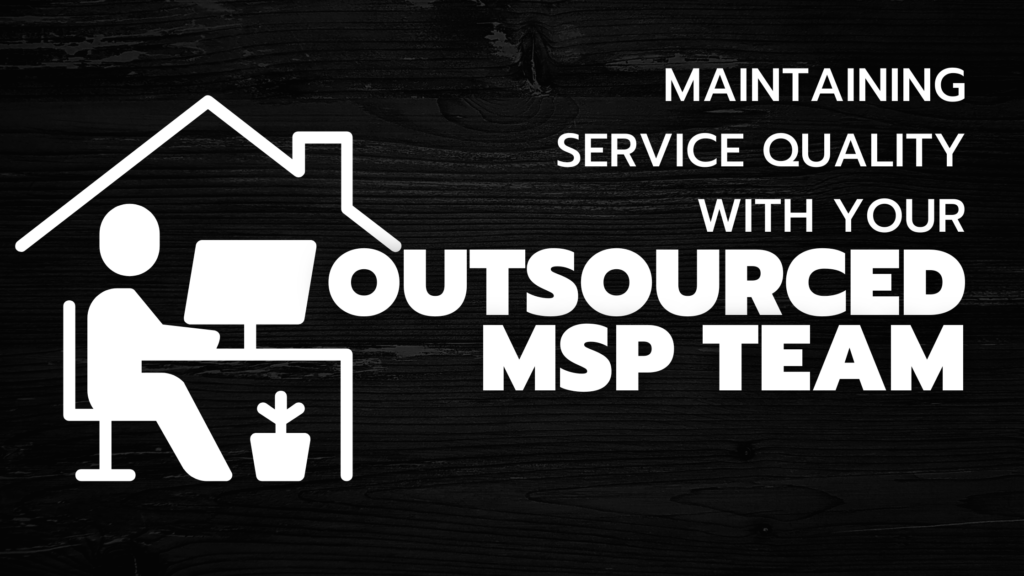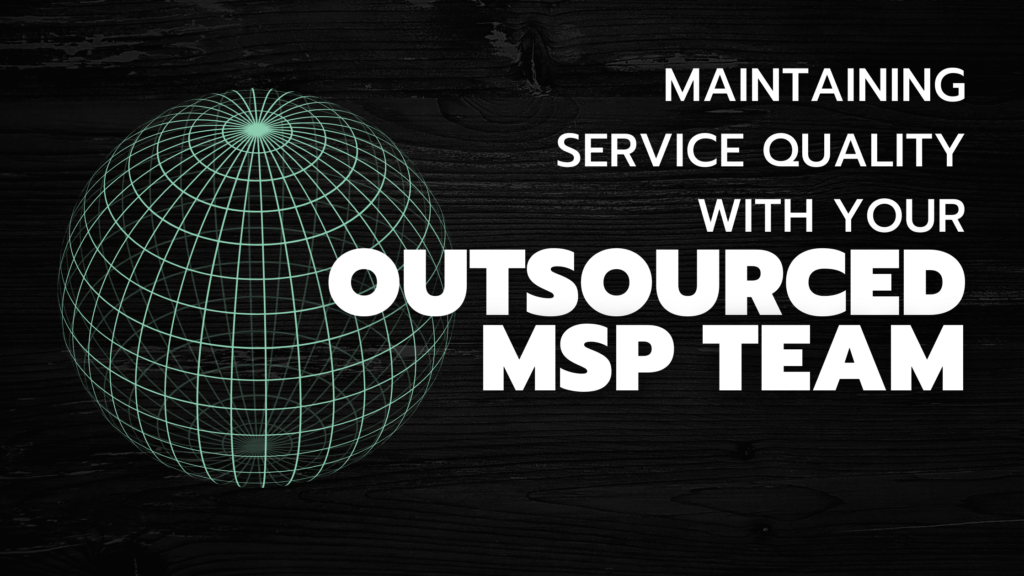Maintaining service quality with an outsourced MSP team is crucial for business success. You can successfully bridge challenges such as communication barriers and quality control with proven strategies.
Key points include establishing clear SLAs, implementing robust communication channels, and fostering a strong team culture.
This guide also covers monitoring performance, training, and risk management to ensure consistent, high-quality service from outsourced teams.
How to Maintain Service Quality with an Outsourced MSP Team?
- Brief overview of the increasing trend of outsourcing in the MSP industry.
- The critical importance of maintaining high service quality with an outsourced team.
- Identify the situations in which an MSP organization is most likely to decide to outsource

Identify the situations in which an organization is most likely to decide to outsource:
MSP organizations often decide to outsource when they face resource constraints, need specialized skills, or aim to reduce operational costs. Outsourcing is particularly appealing in situations where scaling the in-house team is impractical or too costly. Additionally, MSPs may choose to outsource to gain access to advanced technologies and expertise, streamline operations, or focus more on core business activities. This strategic move allows MSPs to enhance service delivery and maintain competitiveness in the rapidly evolving IT landscape.
Brief overview of the increasing trend of outsourcing in the MSP industry:
The trend of outsourcing IT services, including MSP staffing, is on the rise as companies seek cost-effective solutions to meet their technical needs. Outsourced IT management offers businesses the flexibility to scale operations and access specialized skills.
The critical importance of maintaining high service quality with an outsourced team:
Maintaining high service quality is crucial when leveraging an outsourced MSP team. The success of outsourcing IT depends on overcoming various challenges to ensure that the outsourced team delivers consistent, high-quality service.
Understanding the Challenges of Outsourced MSP Teams
- Communication barriers. Issues related to time zones, language, and cultural differences.
- Quality control. Ensuring consistent service quality across different locations.
- Security concerns. Maintaining data security and compliance with regulations.
- Integration issues. Seamlessly integrating outsourced teams with in-house staff and processes.
Communication barriers. Issues related to time zones, language, and cultural differences:
One of the primary challenges of outsourcing is navigating communication barriers. Different time zones, language differences, and cultural nuances can complicate interactions and lead to misunderstandings.
Quality control. Ensuring consistent service quality across different locations:
Maintaining consistent service quality is another critical issue in outsourced IT management. With teams distributed across various locations, establishing clear quality standards and regular monitoring is essential. Setting up robust SLAs (Service Level Agreements) helps in defining and maintaining service expectations.
Security concerns. Maintaining data security and compliance with regulations:
Data security is a major concern when outsourcing IT functions. Ensuring that the outsourced team complies with industry regulations and company policies is vital. Businesses worry about data breaches and compliance issues when working with MSP outsourcing services.
Integration issues. Seamlessly integrating outsourced teams with in-house staff and processes:
Integrating outsourced MSP staff with in-house teams can be challenging, especially in maintaining workflow continuity and cultural alignment. Effective integration requires clear communication, defined roles, and processes that facilitate collaboration. Aligning outsourced and in-house teams through shared goals and regular interaction is crucial.
These challenges can be overcome with confidence with the right know-how, or by using MSP staffing agency services from a reliable provider.
Establishing Clear Service Level Agreements (SLAs)
- Defining expectations. Setting clear and measurable performance standards.
- Regular reviews. Implementing routine performance reviews and feedback loops.
- Penalty clauses. Including clauses for non-compliance to ensure accountability.
Defining expectations. Setting clear and measurable performance standards:
Defining clear and measurable performance standards in SLAs is essential for ensuring quality in outsourced IT management. SLAs should outline specific expectations, including response times, resolution times, and the scope of services provided.
Regular reviews. Implementing routine performance reviews and feedback loops:
Routine performance reviews and feedback loops are critical for maintaining the effectiveness of SLAs. These reviews allow organizations to assess the outsourced team’s performance, address any issues, and make necessary adjustments. As highlighted in a report by Time Doctor, regular reviews foster transparency and continuous improvement in service delivery.
Penalty clauses. Including clauses for non-compliance to ensure accountability:
Including penalty clauses for non-compliance in SLAs ensures accountability and encourages adherence to agreed standards. These clauses outline the consequences for failing to meet performance metrics, providing a financial incentive for the outsourced team to maintain high standards. 51 Blocks emphasizes the importance of clear repercussions for SLA breaches to maintain trust and service quality.
Implementing Robust Communication Channels
- Tools and technologies. Utilizing communication and collaboration tools like Slack, Microsoft Teams, and project management software.
- Regular meetings. Scheduling consistent check-ins and virtual meetings.
- Feedback mechanisms. Creating channels for continuous feedback and issue resolution.
Tools and technologies. Utilizing communication and collaboration tools like Slack, Microsoft Teams, and project management software:
Effective communication is vital for overcoming the challenges of outsourcing IT. Utilizing tools like Slack, Microsoft Teams, and project management software facilitates seamless communication and collaboration between the outsourced MSP team and in-house staff. These tools help bridge gaps caused by geographical and time zone differences, maintaining quality in outsourced MSP helpdesk services.
Regular meetings. Scheduling consistent check-ins and virtual meetings:
Regular check-ins and virtual meetings are essential for maintaining alignment and addressing any issues promptly. Scheduled meetings provide opportunities for the outsourced MSP staff to sync with the in-house team, ensuring that everyone is on the same page. Consistent meetings are recommended to build rapport and enhance communication within distributed teams.
Feedback mechanisms. Creating channels for continuous feedback and issue resolution:
Establishing robust feedback mechanisms allows for continuous improvement and timely issue resolution. Creating channels for both formal and informal feedback helps identify areas for improvement and fosters a culture of openness and collaboration. Using surveys, regular check-ins, and open forums to gather feedback and make data-driven decisions to improve service quality.
Training and Onboarding Processes
- Comprehensive onboarding. Ensuring new outsourced team members understand your company’s processes and culture.
- Ongoing training. Providing continuous education and skill development opportunities.
- Knowledge sharing. Encouraging collaboration and knowledge transfer between in-house and outsourced teams.

Comprehensive onboarding. Ensuring new outsourced team members understand your company’s processes and culture:
A thorough onboarding process is crucial for integrating new outsourced team members into your company. This includes educating them on your company’s processes, tools, and culture. Comprehensive onboarding helps set expectations and align outsourced staff with your business goals, as highlighted in Tycoon Story’s article.
Ongoing training. Providing continuous education and skill development opportunities:
Continuous training and development are vital for maintaining the skills and knowledge of outsourced MSP staff. Regular training sessions ensure that the team stays updated with the latest technologies and best practices, enhancing their ability to provide high-quality service. Careerminds emphasizes the importance of ongoing training in maximizing the potential of outsourced teams.
Knowledge sharing. Encouraging collaboration and knowledge transfer between in-house and outsourced teams:
Fostering a culture of knowledge sharing between in-house and outsourced teams enhances collaboration and efficiency. Encouraging regular communication and joint problem-solving sessions can help both teams learn from each other and improve overall service quality. Knowledge transfer is key to integrating diverse skill sets and perspectives, leading to better outcomes.
Monitoring and Performance Metrics
- Key Performance Indicators (KPIs). Identifying relevant KPIs to track service quality.
- Real-time monitoring. Using monitoring tools to track performance and productivity.
- Performance reviews. Conducting regular performance evaluations and providing constructive feedback.
Key Performance Indicators (KPIs). Identifying relevant KPIs to track service quality:
Establishing clear KPIs is essential for measuring the effectiveness of outsourced IT management. Relevant KPIs might include response time, resolution time, customer satisfaction, and system uptime.
Real-time monitoring. Using monitoring tools to track performance and productivity:
Implementing real-time monitoring tools helps track the performance and productivity of outsourced MSP staff. These tools provide valuable insights into how well the team meets SLA requirements and other performance metrics. The Time Doctor blog discusses the benefits of real-time monitoring in ensuring transparency and accountability.
Performance reviews. Conducting regular performance evaluations and providing constructive feedback:
Regular performance reviews are crucial for maintaining high service standards. These evaluations provide an opportunity to recognize achievements, address shortcomings, and set goals for future improvement.
Fostering a Strong MSP Team Culture
- Building relationships. Encouraging team-building activities and social interactions.
- Inclusivity. Ensuring outsourced team members feel valued and included in the company culture.
- Recognition and rewards. Implementing recognition programs to motivate and reward high performance.
Building relationships. Encouraging team-building activities and social interactions:
Building strong relationships within the team is essential for fostering a cohesive work environment. Encouraging team-building activities and social interactions, both virtual and in-person, helps integrate outsourced MSP staff with the in-house team. This approach, as noted by Time Doctor, enhances collaboration and improves overall team morale.
Inclusivity. Ensuring outsourced team members feel valued and included in the company culture:
Creating an inclusive environment where outsourced team members feel valued is crucial for maintaining high morale and productivity. This involves integrating them into the company’s culture, celebrating their contributions, and ensuring they have equal access to resources and opportunities.
Recognition and rewards. Implementing recognition programs to motivate and reward high performance:
Recognizing and rewarding high performance is a powerful motivator for both in-house and outsourced MSP staff. Implementing recognition programs that celebrate achievements and milestones can significantly boost morale and encourage continued excellence.
Risk Management Strategies For Outsourced MSP Teams
- Data security. Ensuring robust cybersecurity measures are in place.
- Compliance. Keeping up-to-date with relevant laws and regulations to avoid legal issues.
- Contingency planning. Preparing for potential disruptions with backup plans and redundancy measures.

Data security. Ensuring robust cybersecurity measures are in place:
Data security is a top priority when managing an outsourced MSP team. Implementing robust cybersecurity measures, including secure access controls, regular audits, and encryption, is essential to protect sensitive information. As highlighted by Time Doctor, effective data security practices are critical for maintaining trust and compliance.
Compliance. Keeping up-to-date with relevant laws and regulations to avoid legal issues:
Staying compliant with relevant laws and regulations is crucial for avoiding legal issues and maintaining the integrity of outsourced IT operations. This includes understanding and adhering to data protection laws, labor regulations, and industry standards.
Contingency planning. Preparing for potential disruptions with backup plans and redundancy measures:
Effective risk management includes preparing for potential disruptions through comprehensive contingency planning. This involves establishing backup plans, redundancy measures, and crisis management protocols to ensure business continuity. 51 Blocks suggests that having a robust
Final Words on Mainiting Service Quality with an Outsourced MSP Team
- Recap the importance of maintaining service quality with an outsourced team.
- Emphasize the need for clear communication, robust monitoring, and continuous improvement.
Recap the importance of maintaining service quality with an outsourced team:
Maintaining high service quality with an outsourced MSP team is essential for business success and customer satisfaction. The challenges of outsourcing, including communication barriers and quality control, can be effectively managed through strategic planning and implementation.
Emphasize the need for clear communication, robust monitoring, and continuous improvement:
Clear communication, robust monitoring, and continuous improvement are key components in ensuring the success of outsourced IT management. By focusing on these areas, businesses can harness the benefits of outsourcing while mitigating potential risks. The success of outsourcing IT services ultimately depends on the proactive management of these critical factors, ensuring that outsourced teams deliver consistent, high-quality service.



0 Comments